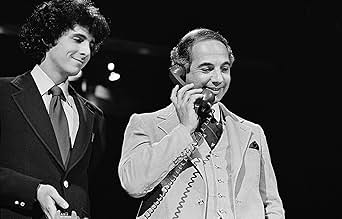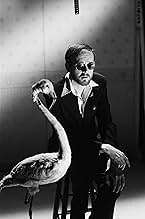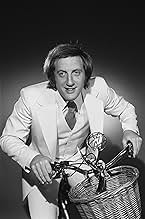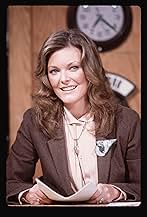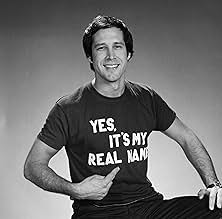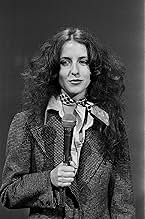Un invitado famoso hace las veces de anfitrión, y celebridades actúan en parodias y sketches creados por el reparto de este inteligente show.Un invitado famoso hace las veces de anfitrión, y celebridades actúan en parodias y sketches creados por el reparto de este inteligente show.Un invitado famoso hace las veces de anfitrión, y celebridades actúan en parodias y sketches creados por el reparto de este inteligente show.
- Ganó 95 premios Primetime Emmy
- 234 premios y 635 nominaciones en total
Explorar episodios
Reseñas destacadas
I like to describe this show like a on and off relationship because one year this show is funny and the next it sucks and it's like that year after year. Still it always manages to make you laugh and it has been the breakthrough show for some of the greatest comedians of all-time.
The first five years of S.N.L. will always be the "golden era" of this show. Belushi, Akroyd, Chase, Curtain, Newman, Morris, Radner and Radner will always represent an era when some of the best comedic talent of the 1970's were all on one show and as a springboard for greatness. However, once the original cast was gone the show went in decline for me. Even though talents like Eddie Murphy, Joe Piscapo, Mike Meyers, Dana Carvey, Martin Short and Billy Crystal became big stars as a result of being on the show, the magic that the original Not Ready for Prime Time Players will never be duplicated. They made Saturday nights worth staying at home.
Saturday night live have been around for a good while now. The fact that the show have fostered many of the greatest comedians and writers should be recognized and celebrated. But due to the amount of episodes the show is very uneven. It spawned some of the best and most quotable comedy sketches but the bad ones outnumber them by a wide margin. The average grade is around 4/10 but you can't grade it without taking the contribution to comedy into account that raises the grade.
But the show is not worth seeing every week. It's better to just see the good sketches on their YouTube page.
More and more I am skipping entire show. The only bright spot is still the weekend update. Cast is great however writing is awful. Few good guests each season and that's it. Soon I believe I will stop watching it entirely. And yes I agree with every agenda they are pushing, it's simply not funny anymore.
Every once in awhile I read reviews of SNL. Almost never do the reviews say "it was OK". Unless it is a review by a frequent viewer, they always say something like "SNL is great again!" or "SNL sucks now". Usually these reviews are from people who never or rarely watch the show, and only remember it from 5, 10, 15 or even 20 years ago. These types of reviews have been the same for as long as I can remember. The periods that people now call "classic" frequently met with poor reviews at the time.
One thing to remember is that the show is an hour and a half, longer than most any other TV show. It is hard to fill such a long show with consistently funny material. It is also hard to make every episode funny. Therefore the show (like most shows) wavers between great and awful, depending on the sketch or episode you are watching at the moment. To judge an entire series on one episode (or part of one) is a mischaracterization.
I've watched SNL for most of its life, and although it has ranged from hilarious to horrible, I would say the average show is "pretty funny". The bottom line: there's nothing better to watch on Saturday night, so until there is, I will always watch SNL!
One thing to remember is that the show is an hour and a half, longer than most any other TV show. It is hard to fill such a long show with consistently funny material. It is also hard to make every episode funny. Therefore the show (like most shows) wavers between great and awful, depending on the sketch or episode you are watching at the moment. To judge an entire series on one episode (or part of one) is a mischaracterization.
I've watched SNL for most of its life, and although it has ranged from hilarious to horrible, I would say the average show is "pretty funny". The bottom line: there's nothing better to watch on Saturday night, so until there is, I will always watch SNL!
¿Sabías que...?
- CuriosidadesIn 1995, Steve Carell auditioned for the show, along with his wife, Nancy Carell. She was cast, he was not. The following season, he was cast as the voice of Gary in the recurring animated segment "The Ambiguously Gay Duo." When he hosted the show in 2005, Carell stated that Will Ferrell beat him for the spot.
- Pifias...almost everything. Live television is largely exempt from the usual rules of goofs.
- Citas
George W. Bush: I'm gonna be around for a long time. On the job, making the tough decisions 24/7. That's 24 hours a week, 7 months a year.
- Versiones alternativasTo avoid paying royalties, some syndicated versions remove the musical performances and the mention of the musical guests in the opening credits is also removed.
- ConexionesEdited into The Best of John Belushi (1985)
Selecciones populares
Inicia sesión para calificar y añadir a tu lista para recibir recomendaciones personalizadas
Detalles
- Fecha de lanzamiento
- País de origen
- Sitios oficiales
- Idioma
- Títulos en diferentes países
- NBC's Saturday Night
- Localizaciones del rodaje
- Empresas productoras
- Ver más compañías en los créditos en IMDbPro
Contribuir a esta página
Sugerir un cambio o añadir el contenido que falta








